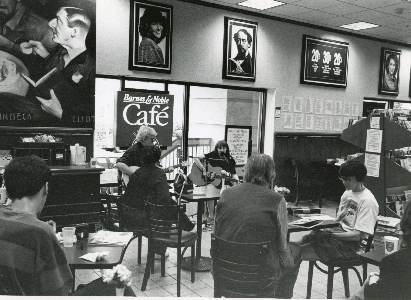Beeman, Bannon & Parrott
B&N Cafe

“ Artist: Beeman, Bannon & Parrott Album Title: Plenty Of Time Review by: Jim Testa The jazz trio Beeman, Bannon & Parrott call Hudson County, New Jersey home, but you won’t often find them in the hipster enclaves of Hoboken. They prefer the cabarets and lounges that dot middle-class communities like Bayonne, where their adult take on the Great American Songbook can be savored and appreciated. Vocalist Barbara Beeman, guitarist Bill Bannon, and multi-instrumentalist (bass, piano, harmonica, vocals) John Parrott comprise the core trio, ably accompanied on this disc by Tim Ouimette on trumpet, Yuriry Zak on accordion, and a few others. The players are all superb, but it’s Beeman’s vocals and, most especially, the group’s brave song choices that shine here. Every interpreter of popular song seeks to bring their own personal style to the song; that’s why Sinatra and Elvis rank as two of the greatest entertainers of the 20th Century. But that task is made much harder when the singer chooses material that’s already indelibly linked to another performer. Barbara Beeman scoffs at that notion; while there are several originals by John Parrott and a few lesser-known standards here, the standout tracks on Plenty Of Time are songs we already know and love, and identify with the artists who popularized them. To which Beeman, Bannon & Parrott shrug and say - No problem. The trio makes them their own. Barbara Beeman’s voice is a delicious mix of the coy and the innocent; she can be sexy and yet retain an air of innocent girlishness and vulnerability. Her high-pitched tenor sounds like the voices embraced by early radio and talkies, when rudimentary microphones made everything tinny and trebly. Beeman’s voice alone evokes nostalgic memories (at least for those of us old enough to remember RKO musicals and Betty Boop cartoons) even before she’s reached the chorus. The trio starts off with Mae West’s “You Gotta See Momma Ev’ry Night,” with Beeman laying on the schmaltz to a simple guitar accompaniment. Beeman makes no attempt to hide the campy nature of the song; in fact, she embraces it, and that makes her delivery a cabaretlicious delight. The arrangement (which does run a bit long at nearly six and a half minutes) expands to include stand up bass and sassy Louis Armstrong-styled jazz trumpet. It’s a complete delight. Parrott’s “Bird On The Street” introduces us to BB&P’s folkie side; there’s a melancholy Leonard Cohen vibe here (not unlike his “Bird On A Wire,” actually) set to a beguiling bossa nova rhythm, accentuated by flamenco guitar and jazzy bass. Edith Piaf’s “La Vie En Rose” transports us to the bistros of Paris, complete with romantic accordion. Beeman fully embraces the idyllic lyric with a demure trill, to beautiful effect. Beeman’s take on the bluesy “Why Don’t You Do Right (Like Some Other Men Do)” recalls Jessica Rabbit’s slinky animated take on the song more than Peggy Lee’s original, especially with Parrott lecherously growling a suggestive call-and- response vocal. Again, this is tart, perky, grownup fun; when Beeman coos “get me some money too,” it’s infinitely sexier than the come-ons by today’s plastic pop divas. Beeman brings a palpable sadness to her moving rendition of Hank Williams’ “I’m So Lonesome I Could Cry,” with a lonesome harmonica accentuating the simple melody. The band evokes that old-timey speakeasy groove on the Parrott original “Plenty of Time,” a delightful duet in which his whiskey-soaked baritone shares lead duties with the coquettish Beeman. Gene Turonis’ whistling – now there’s a lost art – adds a wonderfully nostalgic note, like a forgotten Bing Crosby B-side. “Aragon Mills,” written by political activist and folksinger Si Kahn, proves an inspired and timely choice; it’s description of a destitute and abandoned mill town resonates with the populist uprising we’re seeing across the country, as the middle class and working poor struggle to have their voices heard. BB&P’s exquisite taste in popular standards leads to “I’m Confessin’ That I Love You,” a song that’s been identified with everyone from Louis Armstrong to Perry Como; Beeman’s gossamer touch on the song – set to Bill Bannon’s finger-picked guitar and Parrott’s simple bass line – accentuates the endearing melody and timeless lyrics. And finally, the album closes with Beeman’s breathy, wondrous take on “When You Wish Upon A Star,” forever identified with Ukulele Ike (the voice of Disney’s Jiminy Cricket.) Beeman brings a cabaret feel to much of this material, but this is far the most theatrical performance on the album; close your eyes and you could easily imagine this delivered on a Broadway stage. The simple, stripped down arrangement lets Beeman caress the song’s air of ageless longing; young or old, this is a song everyone can identify with, and Beeman does it proud. Gene Turonis returns to whistle home the melody, ending this eminently enjoyable and sweetly nostalgic journey on an air of wistful imagining. Review by: Jim Testa Rating: 3 stars (out of 5) ” - Jim Testa

